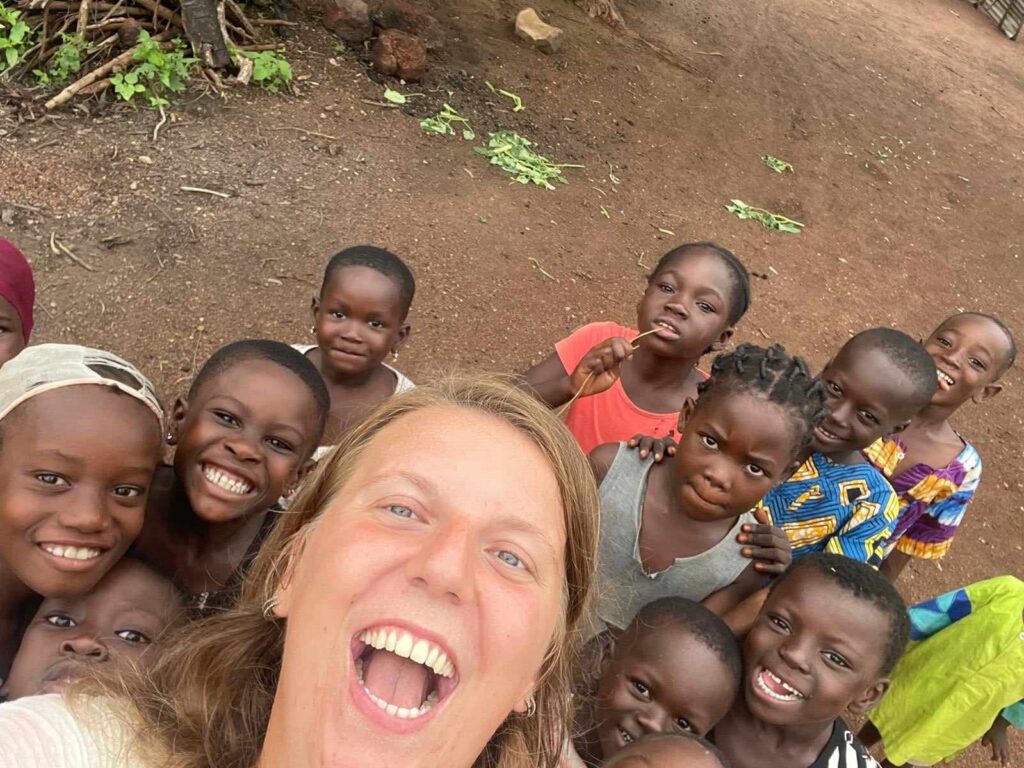
A Conversation with Victoria Bajek ‘21
Victoria Bajek ’21 graduated with a Bachelor of Science in environmental science and sustainability, and took what she learned to make a global impact as a Peace Corps Volunteer in the Northern Region of Ghana. Currently serving as an agricultural extension volunteer, Bajek works alongside small-holder farmers to improve agricultural production systems while also spearheading efforts to expand educational opportunities in her host community.
Bajek and community members are collaborating on a grant proposal to fund the construction of a two-unit housing facility for school teachers. The project is designed to support teacher retention in the remote community, where access to consistent, quality education has been limited due to the challenge of attracting and housing educators.
“The people here, especially the children, have been so wonderful in welcoming me,” Bajek said. “But they receive little education as many teachers are not able to get to my remote community. This project is about changing that reality and building a stronger future.”
Bajek credits her liberal arts education at Allegheny for preparing her to take on such complex and meaningful work.
I am super proud to have Allegheny be my alma mater,” she said. “I can honestly say a lot of the work I do is all thanks to the liberal arts, well-rounded studies I received from Allegheny.
Her time at Allegheny, particularly the liberal arts approach and her service as a Bonner scholar, helped shape her passion for interdisciplinary work and global service. In this interview, she shares her experiences and how Allegheny continues to influence her mission.
Q: What exactly are you doing each day?
Since I serve as an agricultural extension volunteer, no two days look the same—and I love that! Allegheny prepared me to be a generalist in environmental science, which helps me connect everything I do here back to sustainability.
I live in a Muslim community of around 600 people. The day begins early, around 4–5 a.m., in sync with the first call to prayer. I help sweep the compound and fetch water from the local dam, often assisting women with water delivery using my bike—it’s a 2-mile round trip for them on foot.
During farming seasons, I head to the fields with community members. Right now, we’re harvesting cassava and yams. Soon we’ll be collecting shea nuts, and I’ve also worked on groundnut farming, which is incredibly social—groups of women walk up to five miles to farm together.
I’ve also established corn and rice demonstration farms to compare different planting methods and seed varieties. When I’m not farming, I lead several community groups:
- Animal Welfare Group (in partnership with the West African Centre for the Protection of Animal Welfare)
- Beekeeping Group (managing 10 Kenyan top bar hives)
- Women’s Empowerment Groups (with activities like soap making, smokeless stove construction, tree planting, and nutrition demonstrations)
- Young Women’s Empowerment Group (focused on reproductive health education, reusable pad making, and entrepreneurship through crafts)
Right now, the local school struggles with teacher retention, and we’re hoping to build housing that will encourage teachers to stay and improve access to consistent, quality education.
Q: Describe what Northern Ghana is like.
At Allegheny, I was a Bonner Service Leader, and community service in Meadville helped me understand the power of local engagement. My environmental science major was interdisciplinary—I took everything from agricultural economics to gender studies, anthropology, and religious studies. This holistic education made me passionate about understanding and serving marginalized communities.
After Allegheny, I earned my master’s in integrated plant and soil science at the University of Kentucky. With that background, I felt empowered to join the Peace Corps and bring sustainable solutions to rural communities.
Q: What was your minor?
I minored in both biology and religious studies. Biology prepared me academically for graduate studies in plant and soil science, while religious studies gave me a broader perspective that helps me navigate cultural and spiritual nuances in my host community.
Q: Can you share a specific experience that had an impact on you?
There isn’t just one—it’s the accumulation of everyday moments. One memory that stands out is when I was planting my corn demo farm early in my service. I cooked Jollof rice and hoped people would come. At first, no one did. But over time, more and more joined, and we ended the day with a meal together. That sense of support and togetherness meant everything.
The children in my village are also a huge part of my life. They help me with everything—fetching ginger when I’m sick, washing clothes, building a chicken coop, or just playing games. One night, I was feeling down and ready to spend another quiet evening alone, when a group of kids knocked on my window and insisted I join them for a local dance ceremony. We rode bikes in the dark and danced until 2 a.m. It was magical.
Another time, I was stuck in the mud at the dam, and a group of children formed a human chain to pull me out. Their kindness and resilience never cease to amaze me.
The women in my groups are also so inspiring. After one soap-making workshop, they burst into singing and dancing, chanting my local name. It made me realize how much these shared experiences matter—not just for them, but for me too. It’s been an incredibly rewarding journey.


